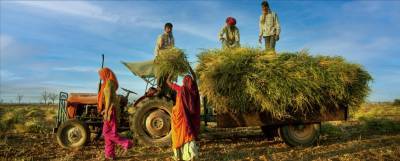MUMBAI, 13 March 2024: India, the world's second-most populous country and one of the largest producers of agricultural commodities, has a vital role to play in ensuring global food security.
With its diverse climatic zones, rich biodiversity, and vast arable land, India has the potential to feed not only its own people, but also contribute to the food needs of other regions. However, the country also faces significant challenges, such as poverty, malnutrition, climate change, food loss and waste, and policy gaps, that threaten its food security and sustainability.
According to the Global Food Security Index (GFSI) 2022, developed by Economist Impact and supported by Corteva Agriscience, India ranks 74th out of 113 countries, with an overall score of 56.5 out of 100 [1]. The GFSI considers four pillars of food security: affordability, availability, quality and safety, and sustainability and adaptation. India performs well on affordability, scoring 72.9, thanks to its large public food distribution system that provides subsidized food grains to nearly 800 million people[2]. However, the country lags behind on availability (48.7), quality and safety (49.3), and sustainability and adaptation (55.1).
One of the main challenges for India is to reduce its food loss and waste, which amounts to about 40% of its total food production[3]. Food loss and waste not only deprives millions of people of adequate nutrition, but also causes environmental and economic damages. According to a study by the Indian Council of Agricultural Research (ICAR), India loses about $14 billion worth of food every year due to poor post-harvest management, inadequate storage and transportation facilities, and inefficient market linkages[4]. Moreover, food loss and waste contributes to greenhouse gas emissions, water scarcity, and soil degradation, which further undermine the country's food security and sustainability.
To address this issue, India needs to invest more in improving its food supply chain infrastructure, enhancing its food processing and preservation technologies, and promoting behavioral change among consumers and producers. The government has taken some steps in this direction, such as launching the Pradhan Mantri Kisan SAMPADA Yojana (PMKSY), a scheme to create integrated food processing hubs, and the Food Safety and Standards Authority of India (FSSAI), a regulatory body to ensure food quality and safety standards. However, more efforts are needed to scale up these initiatives and ensure their effective implementation.
Another challenge for India is to adapt to the impacts of climate change, which poses a serious threat to its food production and security. According to the Intergovernmental Panel on Climate Change (IPCC), India is among the most vulnerable countries to climate change, as it faces increased risks of droughts, floods, heat waves, cyclones, and pest and disease outbreaks. These hazards can reduce crop yields, damage livestock, disrupt food supply chains, and affect food prices and availability. Climate change can also exacerbate existing inequalities and conflicts over natural resources, such as land and water, and affect the livelihoods and well-being of millions of farmers and rural communities.
To cope with these challenges, India needs to adopt more climate-resilient and sustainable agricultural practices, such as diversifying crops, improving soil and water management, using weather-based insurance and early warning systems, and enhancing farmers' access to information, finance, and markets. The government has launched several programs to support these measures, such as the National Mission for Sustainable Agriculture (NMSA), the National Adaptation Fund for Climate Change (NAFCC), and the Pradhan Mantri Fasal Bima Yojana (PMFBY). However, these programs need to be better coordinated, monitored, and evaluated to ensure their effectiveness and efficiency.
India has a unique opportunity to leverage its growing food basket to enhance its own food security and contribute to the global food security agenda. As the current president of the Group of 20 (G20), India can play a leading role in fostering international cooperation and dialogue on food security issues, and share its best practices and lessons learned with other countries. India can also benefit from learning from the experiences and innovations of other countries and regions, and seek partnerships and collaborations with various stakeholders, such as the private sector, civil society, academia, and international organizations.
By addressing its food security challenges and harnessing its food security potential, India can not only achieve its national development goals, but also contribute to the global goals of ending hunger, achieving food security and improved nutrition, and promoting sustainable agriculture by 2030, as enshrined in the Sustainable Development Goals (SDGs).
Source: 1] impact.economist.com, 2] foodbanking.org, 3] drishtiias.com, 4] thecoversation.com
Image credit: niti.gov.in




















